Procedural justice is backed by decades of academic research and has been strongly shaped by the work of Tom R. Tyler, Macklin Fleming Professor of Law and Psychology at the Yale Law School and one of the Founding Directors of the Justice Collaboratory. At the Justice Collaboratory, members and staff have undertaken a variety of projects involving the study of procedural justice in both legal and community settings. Examples of these studies include our work for the New York City Mayor’s Office of Criminal Justice, Facebook and the MacArthur Foundation.
Recent Publications
Below, we list some of the numerous, most recent publications on procedural justice by Tom R. Tyler, Tracey L. Meares and many of our collaborators:
Meares, Tracey L. (2017). "The Path Forward: Improving The Dynamics Of Community-Police Relationships To Achieve Effective Law Enforcement Policies". Columbia Law Review, vol. 117, no. 5, pp. 1355-1368
Meares, Tracey L. (2017) "Policing and Procedural Justice: Shaping Citizens' Identities to Increase Democratic Participation." Northwestern University Law Review, vol. 111, no. 6, pp. 1525-1536.
Meares, Tracey L. (2015) "Everything Old is New Again: Fundamental Fairness and the Legitimacy of Criminal Justice." Ohio State Journal of Criminal Law, vol. 3, no. 1, pp. 105-124.
Meares, Tracey L., Tom R. Tyler and Jacob Gardener. (2015) "Lawful Or Fair - How Cops and Laypeople Perceive Good Policing." Journal of Criminal Law and Criminology, vol. 105, no. 2, pp. 297-344.
Meares, Tracey L., and Peter Neyroud (2015). “Rightful Policing”. New Perspectives in Policing Bulletin. Washington, D.C.: U.S. Department of Justice, National Institute of Justice. NCJ 248411
Meares, Tracey L., and Tom R. Tyler. (2013-2014) "Justice Sotomayor and the Jurisprudence of Procedural Justice." Yale Law Journal Forum, 123, pp. 525-550.
Meares, Tracey L. (2013) "The Good Cop: Knowing the Difference between Lawful or Effective Policing and Rightful Policing - And Why It Matters." William & Mary Law Review, vol. 54, no. 6, pp. 1865-1886.
Tyler, Tom R., and Tracey L. Meares. (2019) "Procedural Justice Policing." In: Weisburd, David and Anthony Braga (ed.) Police Innovation: Contrasting Perspectives. Cambridge Univ. Press.
Tyler, Tom R. and Rick Trinkner (2017) Why Children Follow Rules: Legal Socialization and the Development of Legitimacy. Oxford Univ. Press.
Tyler, Tom R., Phillip Atiba Goff and Robert J. MacCoun. (2015) “The Impact of Psychological Science on Policing in the United States: Procedural Justice, Legitimacy, and Effective Law Enforcement” Psychological Science in the Public Interest, vol. 16, no. 3, pp. 75 –109.
Tyler, Tom R., Jeffrey Fagan, and Amanda Geller. (2014) “Street Stops and Police Legitimacy: Teachable Moments in Young Urban Men’s Legal Socialization.” Journal of Empirical Legal Studies, vol. 11, issue 4, pp. 751–785.
Tyler, Tom. R., and Jonathan Jackson (2014). “Popular legitimacy and the exercise of legal authority: motivating compliance, cooperation, and engagement.” Psychology, Public Policy and Law, vol. 20, no. 1, pp. 78-95.
Tyler, Tom R., Jonathan Jackson and Ben Bradford (2014). Procedural Justice and Cooperation. In: Bruinsma G., Weisburd D. (eds) Encyclopedia of Criminology and Criminal Justice. Springer, New York, NY
Tyler, Tom R. and Steven Blader (2013). Cooperation in groups: Procedural justice, social identity, and behavioral engagement. Routledge.
Bradford, Ben (2014) "Policing and social identity: Procedural justice, inclusion and cooperation between police and public." Policing and Society, vol. 24, no. 1, pp. 22-43.
Bradford, Ben et al. (2014) "Officers as mirrors: Policing, procedural justice and the (re) production of social identity." British Journal of Criminology, vol. 54, no. 4, pp. 527-550.
De Cremer, David et al. (2012) "Procedural justice and sanctions in social dilemmas: The moderating effects of group feedback and identification." Journal of Applied Social Psychology, vol 42, no. 7, pp. 1675-1693.
Granot, Yael et al. (2017) "Zip code of conduct: Crime rate affects legal punishment of police." Translational Issues in Psychological Science, vol. 3, no. 2, pp. 176-186.
Hough, Mike, Jonathan Jackson, Ben Bradford, et al. (2010). "Procedural justice, trust, and institutional legitimacy." Policing: a Journal of Policy and Practice, vol. 4, no. 3, pp. 203-210.
LaGratta, Emily G. (2017) To Be Fair: Conversations about Procedural Justice. Center for Court Innovation
Mazerolle, Lorraine et al. (2013) "Shaping citizen perceptions of police legitimacy: A randomized field trial of procedural justice." Criminology, vol. 51, no. 1, pp. 33-63.
Mazerolle, Lorraine et al. (2013) Procedural Justice and Legitimacy in Policing. Springer Briefs in Criminology.
O'Brien, Thomas C., Tom R. Tyler and Tracey L. Meares. (2019). "Building popular legitimacy with reconciliatory gestures and participating: A community-level model of authority" Regulation and Governance, https://doi.org/10.1111/rego.12264.
Papachristos, Andrew. V., Tracey L. Meares and Jeffrey Fagan (2012). “Why do criminals obey the law? The influence of legitimacy and social networks on active gun offenders.” The Journal of Criminal Law and Criminology, vol. 102, no. 2, pp. 397-440.
Papachristos, Tracey L. Meares and Jeffrey Fagan (2016). "Desistance and legitimacy: The impact of offender notification meetings on recidivism among high risk offenders". Justice Quarterly, vol. 33, no. 7, pp. 1237-1264.
Trinkner, Rick, Jonathan Jackson, and Tom R. Tyler (2018). "Bounded authority: Expanding “appropriate” police behavior beyond procedural justice." Law and human behavior, vol. 42, no. 3, pp. 280-293.
Trinkner, Rick, and Tom R. Tyler (2016). "Legal socialization: Coercion versus consent in an era of mistrust." Annual Review of Law and Social Science, vol. 12, pp. 417-439.
Trinkner, Rick, Tom R. Tyler, and Phillip Atiba Goff. "Justice from within: The relations between a procedurally just organizational climate and police organizational efficiency, endorsement of democratic policing, and officer well-being."Psychology, Public Policy, and Law, vol. 22, no. 2, pp. 158-172.
Weaver, Vesla M., and Amy E. Lerman (2010) "Political consequences of the carceral state." American Political Science Review, vol. 104, no. 4, pp. 817-833.
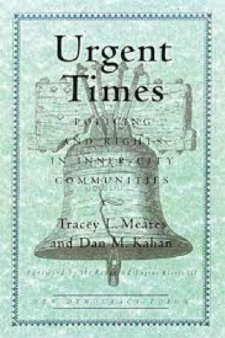
| 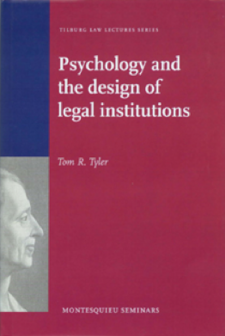
| 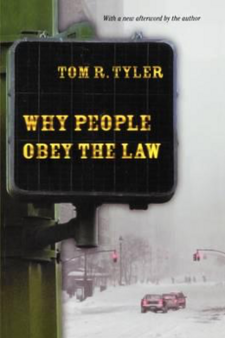
| 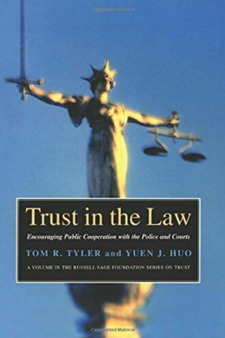
|
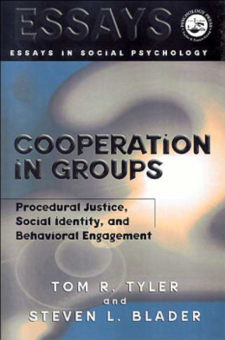
| 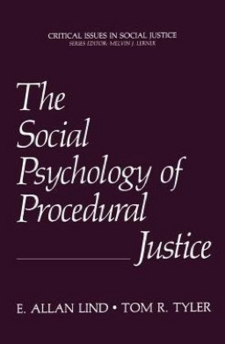
| 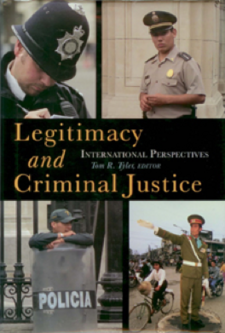
| 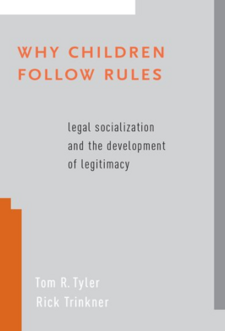
|